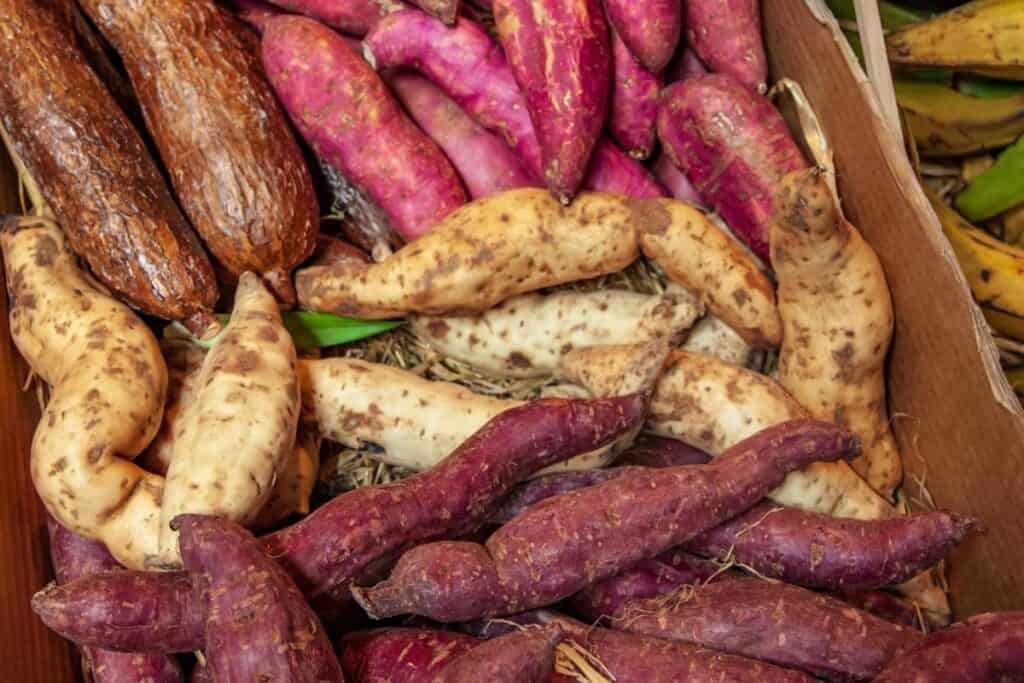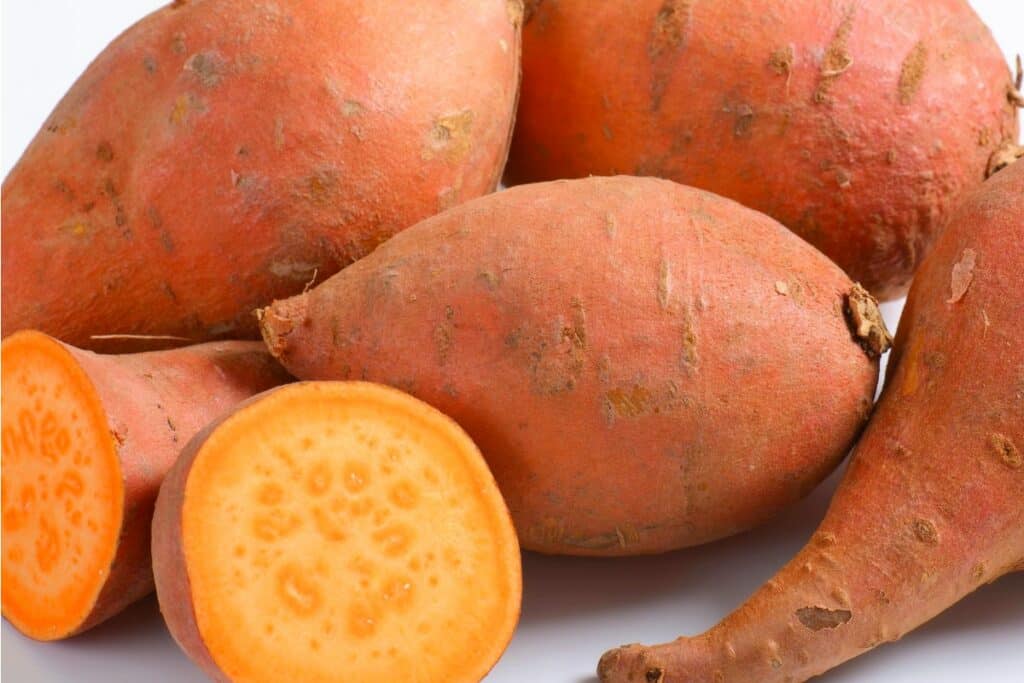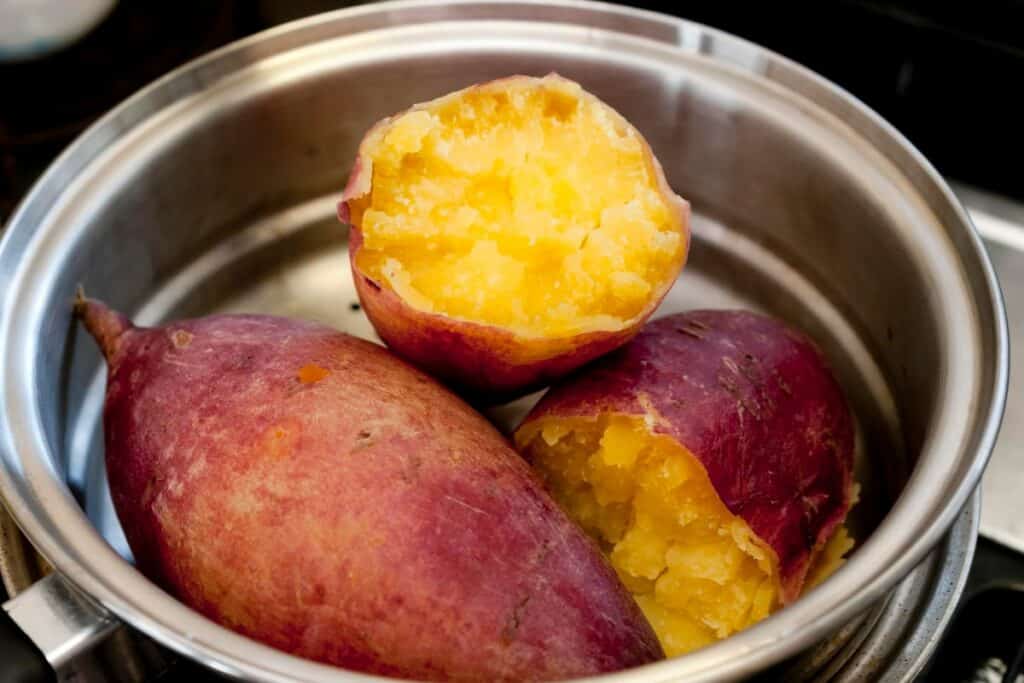Sweet potato fries are one of my favorite alternatives to regular french fries. They are healthier, a bit sweet, and they taste just as good!
But is sweet potato a fruit or vegetable? Is a sweet potato and a regular potato the same thing?
These questions and more will be answered in this article.
- Related article: Fruit and Veg Difference

Is Sweet Potato a Fruit or Vegetable?
Despite their sweet flavor, sweet potatoes are botanically classified as a vegetable.The sweet potato is officially a starchy root vegetable.
Vegetables and fruits are usually classified under the plant part that they develop from. Fruit grows from plant flowers, while vegetables grow from the stems and roots of plants. Fruits generally contain seeds, while vegetables will not have any.
These potatoes grow on the sweet potato plant’s root. They do not contain seeds, nor are they the reproductive part of the plant. Any confusion as to the sweet potato being a fruit will come from its sweet flavor.
The fact that they are a vegetable may be further confused by the vines that grow from sweet potatoes. Its botanical name is Ipomoea batatas and it is a member of the morning glory or bindweed family.
The root is the most popular edible part of this plant, but the stems and leaves of sweet potato plants can also be eaten. The plant has characteristically long stems and vivid leaves. It also flowers with white or light pink blooms growing in clusters.
A sweet potato crop needs approximately six months before it is ready for harvesting.
Are Sweet Potatoes and Regular Potatoes the Same?
Even though they both have “potato” in their name, the sweet potato and regular potato are not the same. They are distantly related as both are in the order of the Solanales. But they are both sweet potatoes and regular potatoes classified as vegetables.
The two types of potatoes have different appearances. They have different textures, and different flavors. Sweet potatoes are more colorful than regular potatoes and are larger in size with an oblong shape.
When uncooked, the two potato types appear similar. Yet once cooked, sweet potatoes contain more calories, fats, and carbohydrates. Sweet potatoes are very starchy, much like regular potatoes.
Regular potatoes contain more protein. Regular potatoes will have more B vitamins. Sweet potatoes have more vitamins A and C and higher mineral content. Both can be prepared in similar ways for consumption.
- Read to learn more – Is Potato a Vegetable?

Are Sweet Potatoes and Yams the Same?
No, sweet potatoes and yams are not the same. True yams are classified as monocots or grass and grass like flowering plants. They are categorized in the Dioscoreales order.
They also differ in appearance. Sweet potatoes are rounder and larger than yams. They come in a variety of colors from purple to yellow. Yams are usually white or beige.
The skins are different between the two as well. Sweet potatoes have a smooth skin that is relatively thin. Yams have patchy skins that are thicker. Yams also tend to be drier, while sweet potatoes maintain a moist texture.
Both vegetables are similar in taste, as both are sweet. However, sweet potatoes are sweeter than yams. They also differ because yams are tubers, while the sweet potato is actually the root.
Both vegetables have similar nutrients, minerals, and vitamins. The cooking of yams and sweet potatoes is very similar. Often they are used interchangeably in cuisine.
How to Know When Sweet Potatoes Are Bad
Once harvested, sweet potatoes can last for several weeks before turning bad. They can rot from the inside out though. This means that their appearance will not indicate if the sweet potato has gone bad. You might only know the sweet potato has gone bad when you slice it open.
Outside signs are often very difficult to see, but bad sweet potatoes may have:
- Discoloration
- Holes
- Mold
- Rotten spots
- Shriveling
Inside the sweet potato, white spotting will develop as it rots. The odor emanating from the sweet potato may also be unpleasant. The sweet potato may be soft and squishy when held.
A sweet potato must never be sticky to the touch or feel wet. Their coloring should be consistently brown, orange, or purple throughout the entire potato.
If the sweet potato excretes a white liquid, this is normal and does not mean the potato has gone bad.
Sweet Potato Storage
Your sweet potatoes will last longer when stored correctly. Freshly harvested sweet potatoes need to be stored in a cool dark and dry location.
A potato bin with a lid is ideal. These potatoes can also be stored in paper bags with wood shavings or sawdust. The wood particles will absorb moisture to prevent rotting.
Do not store uncooked sweet potatoes in a refrigerator.
Once cooked, sweet potatoes can be sliced and frozen. They can last in a freezer for up to 4 months.

Sweet Potato Nutritional Content
Sweet potatoes are considered a healthy food due to their nutrient content. One cup (approximately 200 gr) of baked sweet potato with the skin is 180 calories and contains these nutrients:
- 4 gr. of protein
- 6 gr of fiber
- 30 gr of fat
- 4 gr of carbohydrates
- 769% of the Daily Value (DV) of vitamin A
- 65% of the DV of vitamin C
- 29% of the DV of vitamin B6
- 50% of the DV of manganese
- 27% of the DV of potassium
- 18% of the DV of pantothenic acid
- 15% of the DV of niacin
- 16% of the DV of copper
Purple and orange varieties of sweet potatoes also boast high amounts of antioxidants.
Sweet Potato Health Benefits
Here are some of the health benefits of eating sweet potatoes.
1. Sweet Potatoes Aid in Fighting Cancer
Research shows that antioxidants, known as anthocyanins, fight certain kinds of cancer. These are found in purple sweet potatoes. Research shows aid in fighting bladder, breast, colon, and stomach cancers.
2. Sweet Potatoes Protect Vision
Thanks to the sweet potato’s bright orange hue, they are rich in beta-carotene. One cup of baked orange sweet potato contains 7 times the amount an adult needs daily. Beta-carotene converts to vitamin A.
Studies have also indicated that anthocyanins can protect eye cells. This contributes to improving overall vision health.
3. Sweet Potatoes Support the Immune System
Sweet potatoes are a rich source of beta-carotene. The body transforms beta-carotene into vitamin A. Vitamin A is crucial for a healthy immune system. Thus, sweet potatoes provide lots of vitamin A.
Vitamin A is also recognized as vital to mucous membrane health. This is especially true for your digestive tract lining. A healthy gut helps ensure a healthy immune system.
Is Sweet Potato a Fruit or Vegetable? Final Thoughts
Sweet potatoes are a sweet vegetable that many people enjoy. Sweet potatoes are a great addition to any diet. They are easy to prepare and delicious. You can eat them raw or bake them. They are versatile and nutritious.
They are a good source of vitamins, minerals, and antioxidants. They are low in sodium and cholesterol. Sweet potatoes are a great way to get more vegetables into your diet.
Read more about other edible crops and whether they are fruits or vegetables:

